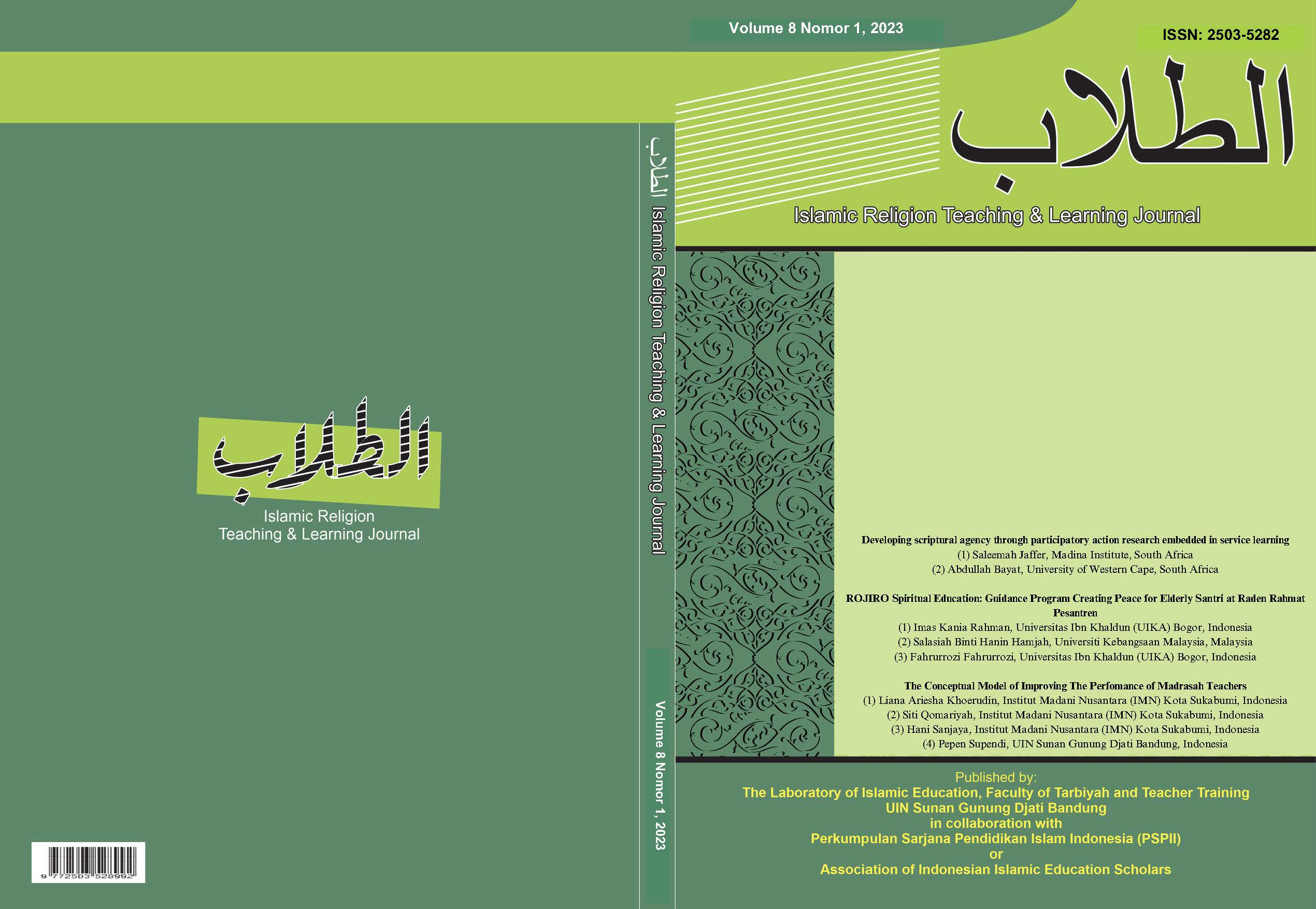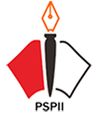Developing scriptural agency through participatory action research embedded in service learning
DOI:
https://doi.org/10.15575/ath.v8i1.21517Keywords:
Service learning, Islam, participatory action research, scriptural agencyAbstract
The paper reports on students at an Islamic higher education institute in South Africa who were enrolled in a service learning module to see whether this led to augmentation in their agency. In the service learning (SL) module, the students were tasked with using community-based participatory action research (CBPAR) which enabled them to make reflective decisions which is the basis of their augmented agency. The research method was a self-study case study. Implications for religious institutions is that they are encouraged to include service learning in their curriculum. The implication for students is that learning faith is about living the faith in context. Lecturers need to shift their pedagogy and teach the faith in an applied manner beyond traditional rote learning. Pedagogic insights included the important role of self-reflection and the activation of student agency through community engagement. Students found participating with community members empowering. Students enjoyed the experience and found the opportunity to transfer scripture into service learning invaluable.  They realised their ability to make a change, lived their scripture, and the community benefited from this.
Â
Artikel ini menjelaskan tentang mahasiswa di sebuah lembaga pendidikan tinggi keislaman di Afrika Selatan yang mengikuti modul pembelajaran pengabdian untuk melihat apakah hal ini dapat meningkatkan kepemimpinan mereka. Dalam modul pembelajaran pengabdian/service learning (SL), para mahasiswa ditugaskan untuk menggunakan penelitian tindakan partisipatif berbasis masyarakat (CBPAR) yang memungkinkan mereka untuk membuat keputusan reflektif yang merupakan dasar bagi peningkatan kepemimpinan mereka. Metode penelitian yang digunakan adalah studi kasus belajar mandiri. Implikasi riset ini bagi lembaga keagamaan adalah bahwa mereka didorong untuk memasukkan pembelajaran pengabdian dalam kurikulum mereka. Implikasi bagi mahasiswa adalah belajar tentang iman berarti bagaimana mengamalkan iman dalam keseharian. Para dosen perlu mengubah pengajaran mereka dan mengajarkan iman dengan cara yang lebih dari sekadar hafalan. Wawasan pedagogis termasuk peran penting dari refleksi diri dan aktivasi kepemimpinan mahasiswa melalui keterlibatan masyarakat. Para mahasiswa merasa bahwa berpartisipasi dengan anggota masyarakat sangat memberdayakan. Mereka menikmati pengalaman ini dan menemukan bahwa kesempatan untuk mengamalkan kitab sucinya ke dalam pembelajaran pengabdian sangat berharga. Mereka menyadari kemampuan mereka untuk membuat perubahan, menghayati kitab suci, dan masyarakat mendapat manfaat dari hal ini.
References
Abduh, I. F., & Taqwa, A. (2022). Rote Learning Methods on Islamic Education Subject in Relation with Students' Learning Motivation. Atthulab: Islamic Religion Teaching and Learning Journal, 7(1), 14-26.
Azlan, N., Amran, N. N., & Ishak, H. (2020). Amalan Service-Learning Berdasarkan Falsafah dan Matlamat Pendidikan dalam Islam. Islamiyyat: International Journal of Islamic Studies, 42(2).
Damm, A. (2011). Mahatma Gandhi and Character Education in Nonâ€Violence: Its Relevance in Religious Studies Today. Teaching Theology & Religion, 14(1), 3-12.
Damons, V., & Dunbar-Krige, H. (2020). The Use of Reflection in a Service-Learning Project in a Post-Graduate Programme. Journal of Service-Learning in Higher Education, 11, 21-40.
Dapena, A., Castro, P. M., & Ares-Pernas, A. (2022). Moving to e-Service Learning in Higher Education. Applied Sciences, 12(11), 5462.
Davids, N., & Waghid, Y. (2019). Democratic education and Muslim philosophy: Interfacing Muslim and communitarian thought. Springer Nature.
Halberstadt, J., Timm, J. M., Kraus, S., & Gundolf, K. (2019). Skills and knowledge management in higher education: how service learning can contribute to social entrepreneurial competence development. Journal of Knowledge Management,23(10),1925-1948.
Koshy, E., Koshy, V., & Waterman, H. (2010). Action research in healthcare. Sage.
Fullerton, A., Reitenauer, V. L., & Kerrigan, S. M. (2015). A grateful recollecting: A qualitative study of the long-term impact of service-learning on graduates. Journal of Higher Education Outreach and Engagement, 19(2), 65-92.
Johannisson, J., & Hiete, M. (2021). Environmental service-learning approach in higher education–a descriptive case study on student-led life cycle assessments of university cafeteria meals. International Journal of Sustainability in Higher Education.
Kolb, D. A. (2014). Experiential learning: Experience as the source of learning and development. FT press.
Matthews, S. (2017). Privilege, poverty, and pedagogy: reflections on the introduction of a service-learning component into a postgraduate political studies course. Educational Research for Social Change, 6(2), 45-59.
Senturk, R. [Recep Senturk ]. (2021, June 8). What is multiplexity? Why is it relevant for today? [Video]. YouTube. https://youtu.be/7AC74Y-WQEE
Sharlanova, V. (2004). Experiential learning. Trakia Journal of Sciences, 2(4), 36-39.
Stanton, T. K., Giles Jr, D. E., & Cruz, N. I. (1999). Service-Learning: A Movement's Pioneers Reflect on Its Origins, Practice, and Future. Jossey-Bass Higher and Adult Education Series. Jossey-Bass Inc., Publishers, 350 Sansome St., San Francisco, CA 94104.
Suddahazai, I. H. K. (2023). Reflecting on Teaching Practice: Adopting Islamic Liberatory Pedagogies within Muslim Institutes of Higher Education in UK (MIHEUK). Religions, 14(2), 223.
Sultana, F. (2007). Reflexivity, positionality and participatory ethics: Negotiating fieldwork dilemmas in international research. ACME: An International Journal for Critical Geographies, 6(3), 374-385.
Omar, S. H. S., Yusoff, S. H., Mohd Safri, A., Razali, M., Ismail, M. S., Zin, A. D. M., & Wok Zin, E. I. E. (2018) Al-Ghazali’s and Maslow’s Approaches in Resolving the Conflict of Human’s Life Necessities, International Journal of Civil Engineering and Technology
Waters, A. (2020). Community Needs Assessment: The Resources and Example Your Organisation Needs. [https://www.galaxydigital.com/blog/community-needs-assessment/]
Downloads
Additional Files
Published
How to Cite
Issue
Section
License
Authors who publish with this journal agree to the following terms:
- Authors retain copyright and grant the journal right of first publication with the work simultaneously licensed under a Creative Commons Attribution-ShareAlike License that allows others to share the work with an acknowledgement of the work's authorship and initial publication in this journal.
- Authors are able to enter into separate, additional contractual arrangements for the non-exclusive distribution of the journal's published version of the work (e.g., post it to an institutional repository or publish it in a book), with an acknowledgement of its initial publication in this journal.
- Authors are permitted and encouraged to post their work online (e.g., in institutional repositories or on their website) prior to and during the submission process, as it can lead to productive exchanges, as well as earlier and greater citation of published work (See The Effect of Open Access).






